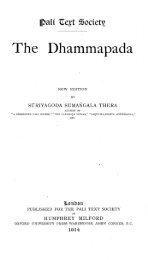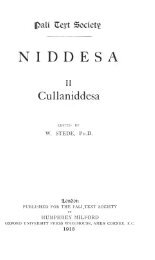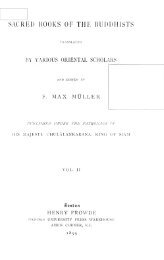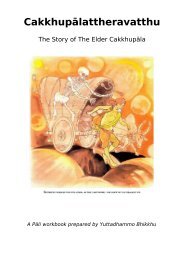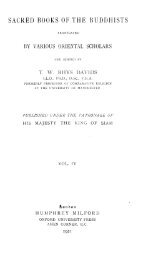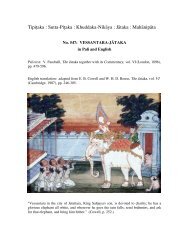Lessons In Practical Buddhism - Sirimangalo.Org
Lessons In Practical Buddhism - Sirimangalo.Org
Lessons In Practical Buddhism - Sirimangalo.Org
Create successful ePaper yourself
Turn your PDF publications into a flip-book with our unique Google optimized e-Paper software.
such sickness. As we get older, we run the risk of all kinds of<br />
disease; stomach problems, skin problems, teeth problems.<br />
I read a story once about a girl who suddenly went crazy,<br />
and they didn’t know why. She was a normal girl who<br />
suddenly went insane, totally uncontrollable, and they found<br />
that she had an impacted wisdom tooth that was hitting a<br />
nerve, and the nerve was going to the brain and causing the<br />
brain to malfunction. When they removed the wisdom tooth,<br />
she got better. This sort of thing can happen to our body.<br />
This doesn’t mean we should hate or loathe the body or even<br />
disregard it; we should take care of it, just as when we have<br />
a wound, we should take care of the wound. An arahant still<br />
takes care of their body. They take care of it as they would a<br />
festering wound or an injury that never fully heals,<br />
something that always has to be dressed and the bandages<br />
changed. Sometimes you have to pull something out like a<br />
tooth or an organ, like the appendix. Anyone who says, “the<br />
body is perfect,” just look at the appendix. People can die<br />
from appendicitis, let alone the many other incurable<br />
sicknesses of the body. This is the ādīnava of the body.<br />
Really, though, the problems with the body are insignificant<br />
in comparison to the problems of the mind. We think, “Well,<br />
if I’m born an angel, then I’ll have a perfect body.” Even<br />
sometimes as a human, it is possible to have good physical<br />
health for many years. As a result, we can become quite<br />
negligent, not interested in things like meditation or insight<br />
wisdom. We might not be able to see the dangers because<br />
we say, “well, maybe one day I will be sick, but how can I<br />
take that as a meditation subject?” As long as the mind<br />
contains impurity, however, it doesn’t matter what state the<br />
body is in. Some people are very, very sick, but their mind is<br />
pure, like Maha Mogallana or Maha Kassapa. Their minds<br />
were so pure, and yet their bodies still got sick; and so<br />
likewise, those of us who are still in good health, our minds<br />
can become very sick.<br />
Seeing the problems with the body is very useful for helping<br />
us give up kāma tanhā (desire for sensuality), but looking at<br />
the mind is much more useful for giving up bhāva tanhā<br />
(desire for becoming) and vibhāva tanhā (desire for not<br />
becoming), wanting things to be like this or like that, wanting<br />
88



